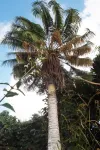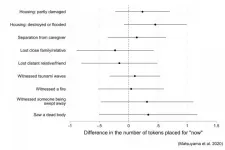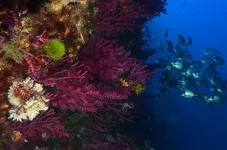Leading blue energy revolution
CUHK Faculty of Engineering develops water-tube-based triboelectric nanogenerator for efficient ocean wave energy harvesting
2021-03-18
(Press-News.org) The ocean covers about 70% of the Earth's surface area and is the largest reservoir of energy. Researchers have been exploring the approach for harnessing ocean energy to solve the world energy crisis and pollution problems caused by thermal power generation. The nanogenerator, including piezoelectric, triboelectric, and pyroelectric nanogenerators, is one of the key technologies for mechanical energy conversion. The triboelectric nanogenerator (TENG) makes use of the triboelectric effect and electrostatic induction to harvest mechanical energy based on contact or sliding electrification.
However, conventional TENG device is often based on solid/solid contact, and it is hard to ensure the contact intimacy of the two tribo-materials. In the meanwhile, the material surfaces will wear or become damaged after long-term friction. Also, the solid/solid-based TENGs need shell structures and/or mechanical components such as springs, holders, and rotors to harvest random vibration energy. The complex structure will reduce the efficiency of energy harvesting.
The research team led by Prof. Zi Yunlong, Assistant Professor of the Department of Mechanical and Automation Engineering at CUHK, has recently overcome the above technical limitations and developed a water-tube-based TENG (WT-TENG) for irregular and low-frequency environmental energy harvesting, such as water waves. They encapsulated water in a finger-sized tube (FEP). When water moves in the tube between regions of the two electrodes, triboelectrification happens and electric currents can be generated. Taking advantage of the flexibility of water, the WT-TENG can be operated in various modes, including rotation, swing, seesaw, and horizontal linear modes, to harvest energy from diverse mechanical movements in the environment, such as ocean waves, wind, body and vehicle movements. Due to the high contact intimacy of water and the tube surface, the output volumetric charge density of the WT-TENG is significantly enhanced, reaching 9 mC/m3 at a frequency as low as 0.25 Hz, which is beyond all previous reports.
Moreover, just like toy building bricks, multiple small WT-TENG units can be easily combined and integrated as one larger unit and realise multiplied electric outputs. Researchers designed two power generation units. One is a box with 34 WT-TENG units which was placed in the sea to collect ocean wave energy. Another one is a wristband composed of 10 WT-TENG units. A researcher put it on and kept swinging her arms for body motion energy harvesting. The peak power generations of the two tests were both enough to drive 150 LED light bulbs.
Prof. Zi Yunlong stated, "Previous designs of ocean energy harvesters have been equipped with electromagnetic-based generators which are large in size and heavy, and will only generate power if the frequency of ocean waves reaches a certain high level. Our latest research has overcome the technical hurdles and will promote the use of nanogenerators, especially in "blue energy" harvesting, offering a new direction for the development of renewable energy to achieve carbon neutrality."
Related research results were recently published in the internationally renowned journal Advanced Energy Materials. The first author of the article is Postdoctoral Fellow Dr. Wu Hao, and Professor Zi Yunlong is the only corresponding author. Professor Wang Zuankai from the City University of Hong Kong participated in the guidance of this work.
INFORMATION:
About Prof. Zi Yunlong
Prof. Zi Yunlong joined CUHK in 2017. He has been working on energy harvesting through the emerging TENG technology and self-powered systems, with a series of independent research achievements and several awards. This project was funded by the Early Career Scheme of Research Grants Council, the Innovation and Technology Fund of the Innovation and Technology Commission of the Hong Kong SAR, Shun Hing Institute of Advanced Engineering, and Guangdong Basic and Applied Basic Research Fund.
ELSE PRESS RELEASES FROM THIS DATE:
2021-03-18
Research from the University of Kent's School of Biosciences has revealed that a molecule produced by the human immune system can severely diminish the potency of certain antibiotics.
This may explain why antibiotics effective in laboratory settings can be less effective at clearing infections in humans.
The research findings, which have been published in the journal Archives of Microbiology, reveal that nitric oxide, a molecule produced by our immune systems, can render aminoglycoside antibiotics ineffective when used against E. coli strains isolated from ...
2021-03-18
Geopolitical boundaries can have a profound effect on the protection of threatened species. A case in point is the native cycads of the United States. A recent review paper written by researchers at the Western Pacific Tropical Research Center at the University of Guam highlights extinction risks of cycad species that occur in U.S. controlled lands and the profound effect geopolitical boundaries has had on the protection of these threatened species. The paper appears in the December 2020 issue of the MDPI journal Diversity.
Cycads are the most threatened plant order worldwide. This is due to a combination of factors including habitat loss, poaching predation by invasive species, and lack of appropriate ...
2021-03-18
Shipping provides the very foundation for world trade, by moving an estimated 11 billion tonnes of goods a year from where they are produced to where they will be used. From TVs to toasters, soap to sugar -- much of it moves over the waves.
Yet for ships plying the open ocean and for offshore industries, waves present an enormous challenge --because they can increase operational risks, reduce operating efficiency, and be dangerous if large enough and not handled well -- and they can be difficult to predict.
Ships can access information about wave heights, directions and frequency, but those data may be expensive to obtain or delayed because of satellite communication limitations, says Zhengru ...
2021-03-18
Undocumented women in Finland access pregnancy care later than others. Yet, screening of infectious diseases at the early stages of pregnancy would be particularly important to these women, a new study carried out in Helsinki, Finland, shows. Conducted by the University of Eastern Finland and the University of Helsinki, the study on undocumented women's pregnancy care and childbirth was published in BMC Pregnancy and Childbirth.
Undocumented pregnant women constitute a vulnerable group of people who lack equal access to pregnancy care. Previous ...
2021-03-18
Study finds that children who experienced housing loss in the 2011 Great East Japan Earthquake are more inclined to opt for short-term gratification
Tokyo - Living through a tragic event might make us more inclined to live for the moment, but not always in a good way. Research is looking into the psychological after-effects among children who survived the 2011 Great East Japan Earthquake, and a recent study may have made a connection: the children may forgo greater long-term reward for short-term pleasure.
Among the traumatic experiences in the quake and subsequent tsunami that killed almost 16,000 people, some survivors witnessed people washed ...
2021-03-18
In their pursuit of maximum reward, people suffering from gambling disorder rely less on exploring new but potentially better strategies, and more on proven courses of action that have already led to success in the past. The neurotransmitter dopamine in the brain may play an important role in this, a study in biological psychology conducted at the University of Cologne's Faculty of Human Sciences by Professor Dr Jan Peters und Dr Antonius Wiehler suspects. The article 'Attenuated directed exploration during reinforcement learning in gambling disorder' has appeared in the latest edition of the Journal of Neuroscience, published ...
2021-03-18
In cancer immunotherapy, cells in the patient's own immune system are activated to attack cancer cells. CAR T cell therapy has been one of the most significant recent advances in immunotherapies targeted at cancer.
In CAR T cell therapy, T cells are extracted from the patient for genetic modification: a chimeric antigen receptor (CAR) is transported into the cells using a viral vector, helping the T cells better identify and kill cancer cells. When the antigen receptor cells identify the desired surface structure in the patient's cells, they start multiplying and killing the target cells.
CAR T cell therapy was introduced to Finland in 2018, and the treatment form has been used in support of patients suffering from leukaemia and lymphomas.
So ...
2021-03-18
A Delphi survey carried out by Dr Lyn Robinson, Head of Department and Reader in Library and Information Science at City, University of London, and Dr David Haynes, former Visiting Lecturer and Post-Doctoral Fellow in City's Department of Library and Information Science, has revealed priorities for protecting personal privacy online.
Their research study, "Delphi study of risk to individuals who disclose personal information online", published in the Journal of Information Science, was conducted at City in 2019, and is based on the views of a panel of privacy and information security experts.
A literature review, published between 2014 and ...
2021-03-18
For years, in the vastness of our galaxy, astrophysicists have been tracking down pevatrons - natural accelerators of particles with monstrous energies. Thanks to the HAWC Observatory for Cosmic Radiation, another probable trace of their existence has just been found: photons with some of the highest energies. However, what is particularly important is that this time the high-energy photons have not only been recorded, but also their probable place of origin has been determined.
We know they exist, we just don't know where exactly they are or what they look like. Pevatrons - because this is what we are talking ...
2021-03-18
Marine heatwaves are dramatically affecting the marine ecosystems of the world and the Mediterranean is no exception. In the Mediterranean, these extreme climate episodes and its resulting massive mortality of species are getting more and more intense and frequent. To date, most of the studies analysed the effects of these perturbations on specific species and populations, although researchers still do not know how this affects the functioning of the involved ecosystems.
A new study led by the University of Barcelona (UB) and the Institute of Marine Sciences (ICM-CSIC) has stated that marine heatwaves are having a strong impact on the functioning of coraligen, one of the most emblematic ...
LAST 30 PRESS RELEASES:
[Press-News.org] Leading blue energy revolution
CUHK Faculty of Engineering develops water-tube-based triboelectric nanogenerator for efficient ocean wave energy harvesting



